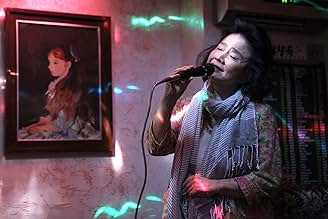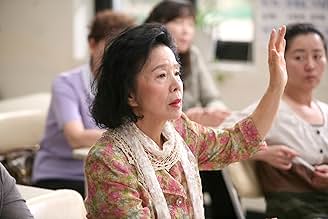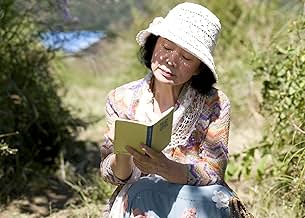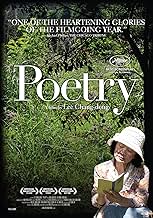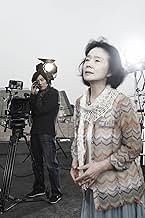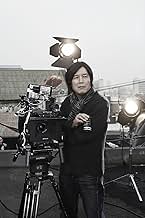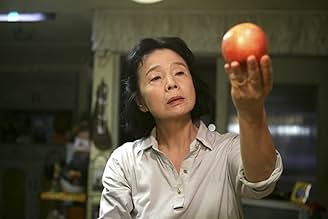NOTE IMDb
7,8/10
14 k
MA NOTE
Une femme dans la soixantaine, confrontée à la découverte d'un crime familial atroce et aux premiers stades de la maladie d'Alzheimer, trouve force et volonté dans un cours de poésie.Une femme dans la soixantaine, confrontée à la découverte d'un crime familial atroce et aux premiers stades de la maladie d'Alzheimer, trouve force et volonté dans un cours de poésie.Une femme dans la soixantaine, confrontée à la découverte d'un crime familial atroce et aux premiers stades de la maladie d'Alzheimer, trouve force et volonté dans un cours de poésie.
- Récompenses
- 27 victoires et 25 nominations au total
Histoire
Le saviez-vous
- AnecdotesThe idea for the film had its origin in a real-life case where a small town schoolgirl had been raped by a gang of teenage boys. When director Lee Chang-dong heard about the incident, it made an impact on him, although he hadn't been interested in basing a film on the actual events. Later, during a visit in Japan, Lee saw a television program in his hotel room. The program was edited entirely from relaxing shots of nature, "a peaceful river, birds flying, fishermen on the sea with soft new-age music in the background," and a vision for a possible feature film started to form. "Suddenly, it reminded me of that horrible incident, and the word 'poetry' and the image of a 60-year old woman came up in my mind."
- ConnexionsFeatured in At the Movies: Cannes Film Festival 2010 (2010)
Commentaire à la une
Poetry (2010)
Steady and stealthy, this film proposes to be as lyrical and compact as a poem, but then it keeps going and ends up larger and more impressive than you'd expect. And the acting by leading female actress, the Korean star Jeong-hie Yun, is startling and nuanced, a great performance.
At the heart of the plot are two plots. The first is the title line—elderly Mija has decided to learn how to write poetry, so she attends a class (filled with younger students). The second is about a sex crime—a gang rape it turns out—by her grandson, who she is raising alone. The two are nearly opposites in so many ways we see how life itself balances the beautiful and ugly, and responsibility and indifference. In a larger way, "Poetry" is about contemporary life in Korea, and the interactions of ordinary people in extreme situations will be revealing to many outside of Korea.
It's hard to overstate how well this movie pulls off something socially serious and yet makes it all understated and almost matter of fact. There are these several lines of thought that keep going throughout, and that don't quite converge until the very end, which is both tragic (truly) and a bit mysterious. What exactly is the implication of that last scene on the bridge, and the water that shows nothing? It hearkens to the beginning, of course, but we have our main character at hand.
In that sense, it's a brilliant, almost perfect evocation of contemporary Korea on the most normal, middle class level. Lovely and loving, and cold and brutal. And it shows the glib sexism of the men there, much like everywhere at various times. And how to survive you sometimes have to just proceed. And then, of course, sometimes you do not survive.
Steady and stealthy, this film proposes to be as lyrical and compact as a poem, but then it keeps going and ends up larger and more impressive than you'd expect. And the acting by leading female actress, the Korean star Jeong-hie Yun, is startling and nuanced, a great performance.
At the heart of the plot are two plots. The first is the title line—elderly Mija has decided to learn how to write poetry, so she attends a class (filled with younger students). The second is about a sex crime—a gang rape it turns out—by her grandson, who she is raising alone. The two are nearly opposites in so many ways we see how life itself balances the beautiful and ugly, and responsibility and indifference. In a larger way, "Poetry" is about contemporary life in Korea, and the interactions of ordinary people in extreme situations will be revealing to many outside of Korea.
It's hard to overstate how well this movie pulls off something socially serious and yet makes it all understated and almost matter of fact. There are these several lines of thought that keep going throughout, and that don't quite converge until the very end, which is both tragic (truly) and a bit mysterious. What exactly is the implication of that last scene on the bridge, and the water that shows nothing? It hearkens to the beginning, of course, but we have our main character at hand.
In that sense, it's a brilliant, almost perfect evocation of contemporary Korea on the most normal, middle class level. Lovely and loving, and cold and brutal. And it shows the glib sexism of the men there, much like everywhere at various times. And how to survive you sometimes have to just proceed. And then, of course, sometimes you do not survive.
- secondtake
- 14 sept. 2014
- Permalien
Meilleurs choix
Connectez-vous pour évaluer et suivre la liste de favoris afin de recevoir des recommandations personnalisées
- How long is Poetry?Alimenté par Alexa
Détails
Box-office
- Budget
- 1 300 000 000 ₩ (estimé)
- Montant brut aux États-Unis et au Canada
- 356 149 $US
- Week-end de sortie aux États-Unis et au Canada
- 18 900 $US
- 13 févr. 2011
- Montant brut mondial
- 2 539 040 $US
- Durée2 heures 19 minutes
- Couleur
- Mixage
- Rapport de forme
- 1.85 : 1
Contribuer à cette page
Suggérer une modification ou ajouter du contenu manquant



